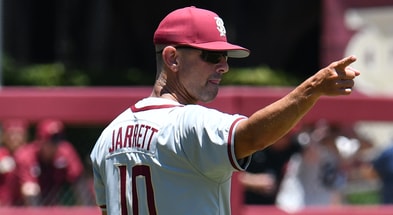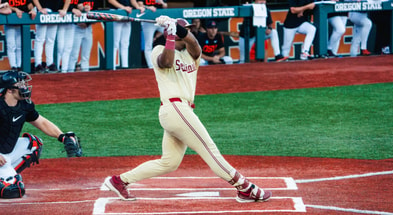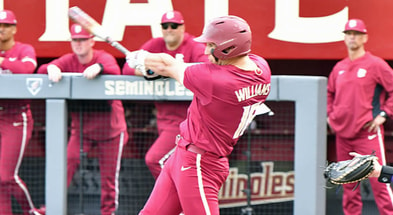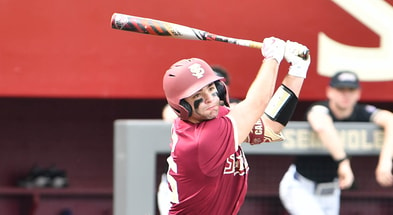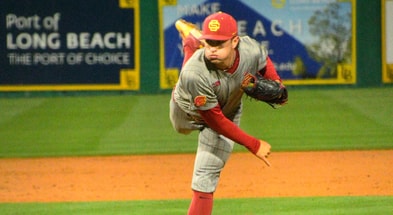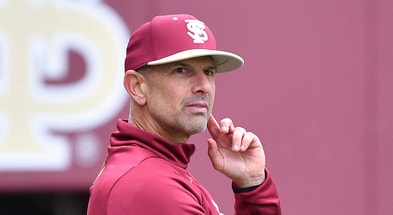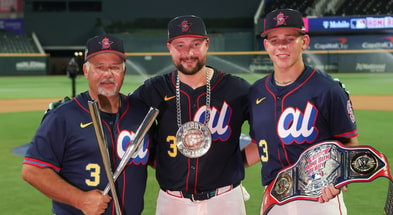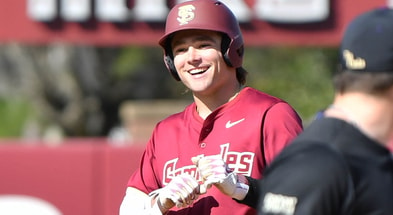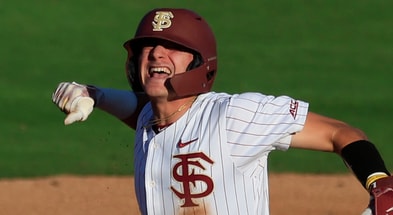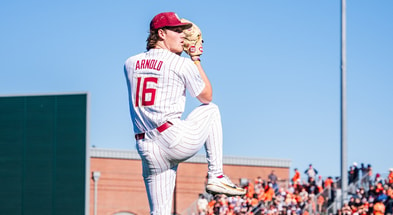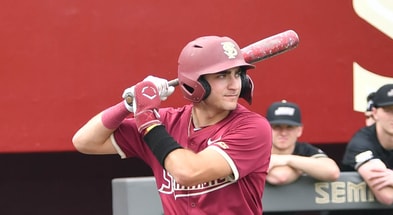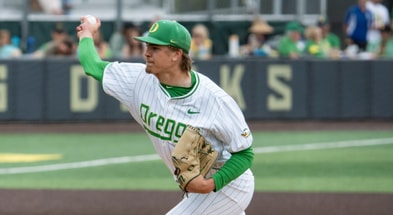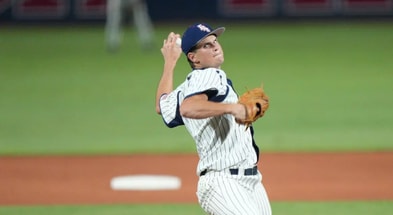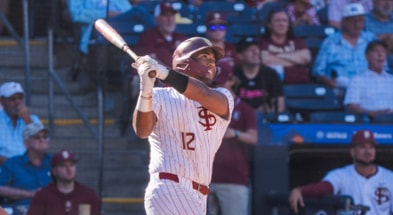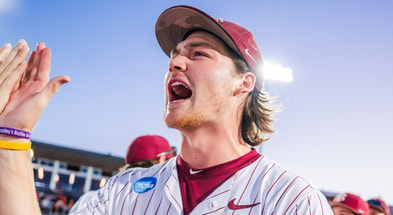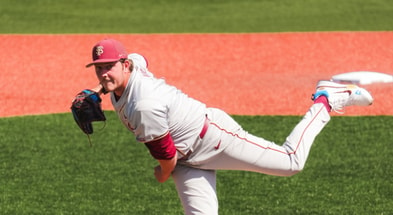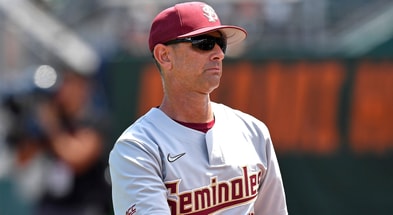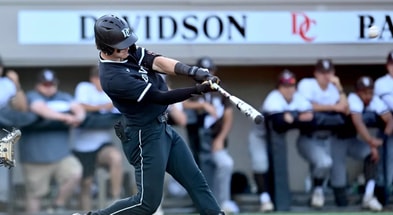Q&A: Getting to know new FSU pitching coach Chuck Ristano

With the Florida State baseball team going through its first fall practice under new head coach Link Jarrett, Warchant will be introducing you to his assistant coaches in the coming days.
First up is pitching coach Chuck Ristano, who spent 12 years at Notre Dame and helped Jarrett take the Irish to the 2022 College World Series earlier this year.
In this interview, Ristano discusses what he enjoys about working for Jarrett, what it was like making their run to Omaha and knocking off No. 1 Tennessee in Knoxville, why he left South Bend for Tallahassee, the approach he is taking with his new pitching staff and more.
Q: So we know you were at Notre Dame for almost a decade before Link even got there, but how did you end up there? What was your path?
A: I did four years at Monmouth University, which was my first full-time job as a coach. Down on the Jersey Shore, and we had some really good teams. Made a couple of regionals. I did one year at Temple University when they had a baseball team. And when my former boss got the job at Notre Dame, I went with him as the volunteer [assistant]. But I always ran the pitching staff. I thought it was actually a decent model because being a volunteer didn’t allow you to recruit, but it guaranteed that you’d be at practice every day. So I was able to kind of hone my skills as a pitching coach during those couple of years I was a volunteer.
I eventually became full-time and was able to get out and recruit. And when Coach Jarrett came on, I stayed with him. And I was there for all three of his years and the transition, and I’m obviously really thrilled to have made the move down here with him.
Q: What did you know about him before he came to Notre Dame? And what sold you on him as a head coach when he got there?
A: I think more than anything the way he goes about his business. I think he’s got pretty unimpeachable character. He’s a dad who already had a son who played in the ACC (J.T. Jarrett was a starting second baseman at N.C. State), and they could relate to what life was like in the league. I knew his career at Florida State was obviously pretty storied. But as a coach, before anything, I knew that he was a good man. And then I knew that he was an offensive wizard. But I think the most staggering thing, once we actually got to work together, is how great he is at teaching fundamental defense and the totality of the game.
I think most people thought, “Oh, yeah, Link’s teams are just gonna score a million runs.” But when you actually get in there, and dive into the day-to-day, you realize how good he is with the fundamentals of defense and base-running and playing offense — that’s really what he excels at. I didn’t expect the level of attention to detail on the defensive side, because most people think of him as an offensive guy. But just talking to him as the process unfolded with his transition to Notre Dame, it became so apparent how detail-oriented he was, and that’s why I think he’s had the success he’s had as a coach. But yeah, before anything, a person of really high character is what stood out.
Q: I’m guessing that attention to detail on the defensive side excites you as a pitching coach.
That’s nice. Yeah. And it impacts how we recruit. Everybody wants to find a game-changing bat, and we need to have those guys. But before anything, Link always makes sure we ask ourselves, “OK, where does he play on the field? What functional defensive position can he play?” And you saw our offenses at Notre Dame. It wasn’t filled with a bunch of guys who had 18 home runs. We just found ways to play offense. We could score in so many different ways. And that positional versatility, I think, is what he’s hunted. And I think that’s why we had the success we had at Notre Dame.
Q: It’s well-documented that Notre Dame hadn’t been to the College World Series in 20 years and very few times in history. What was that season like?
A: Coming off of the ’21 season where we were a game away from Omaha, and we knew we returned a large portion of our roster, it was nice to get a taste of playing in the super regionals in a hostile environment. It was nice to get a taste of the path to advance in the postseason. But making sure we prepared our guys for the weight of expectation, I think, was really critical.
Going into ’21, we were optimistic, but the expectations were probably tempered a little bit. It was probably not as much of a bullseye on our back. [But in ’22], the fact that we had guys who had been in the program for three or four years, most of which either started or were in the early stages of their career when Coach Jarrett got there, they knew the system. It was really rewarding to begin practice and skill sessions kind of knowing the expectation, having a grasp of the team concepts, so it made the preparation a little more seamless.
We added a couple of pieces on the mound that we knew would be really critical. And I don’t think we ever really stopped to smell the roses. It was kind of just like a train we kept pushing forward. We came out very hot and we were very good, then we tasted some adversity and Louisville beat us up pretty good. Duke beat us up pretty good. But we kind of just kept going. The maturity in the group and the attitude that Link installed, we all really fed off of it. And we were disappointed we didn’t host a regional. We thought we had earned that. And then we get sent to Georgia Southern, which was an unbelievable atmosphere but it was a place that was somewhat foreign to us.
So we figured out Statesboro, and it was a pretty hostile environment. We pushed through that and then we get the Tennessee [super regional]. And I don’t know … if that wasn’t the best college team ever assembled, it was pretty close. But the the resolve our kids had, the maturity, battle-tested, however you want to call it … just watching them not blink. We win pretty convincingly in Game 1. They beat us pretty convincingly in Game 2. And then Game 3 was just a bit of a dogfight. And to see kids that just won’t blink, that is something we’re so proud of. The fact that we were like a concrete wall you just couldn’t knock down.
So you win there and you go to Omaha, and it’s the first time I’d been there, and it was great. We beat Texas, and then we got beat by two really good teams and ran into a couple of really good arms. But everything happened so fast afterward. I hadn’t really taken the time to enjoy it, you know? So we spent some time reflecting and smiling about some of it, and it was unbelievable. To do it at a place like Notre Dame, a place I love so dearly having spent 12 years there, you kind of feel like it closes a book. And you can say, “I’m very proud of the fact that we left after helping the program reach new heights.”
Q: Going back to that Tennessee Super Regional, I’ve watched a lot of baseball tournaments through the years. And when the underdog wins the first game and then loses the second, it usually doesn’t go well for the underdog in the third game. Especially on the other team’s field. And then when you add in how loaded that Tennessee team was and how crazy their crowds were, how did you guys approach that game and pull it out?
A: We had felt our backs against the wall a little bit in the regular season. You know, in the ’21 season, we lost one series the whole year before the postseason. And that was to Florida State. Well, we knew what it felt like to get swept last year. We knew what it felt like to lose some games at home. So in addition to the experiences accrued over those last two years, watching how our guys responded to the atmosphere at Tennessee, I didn’t feel like Game 3 was going to come down to our inability to manage the atmosphere. It was just that they were so good at taking innings that they should have scored one or two runs and scoring seven. So it was more like, “They are going to score. Just let it be one. Let the solo home run be. Let the double that scores a run be.”
And then we found ourselves in the sixth or seventh inning down 3-1. And you don’t feel like, “Hey, we’ve got them right where we want them.” But I knew that we knew how to win in close games late, and we hit the back-to-back home runs, and you’ve got (Jack) Findlay ready to go. So you feel like, “OK, you’re in a good spot.” I felt like as soon as we can stabilize the game and not let them have that big inning, I liked our chances. You knew at any moment they could strike like a viper, you know, but (Alex) Rao was an older guy, and we handed him the ball. And Findlay, while he was a young guy, we just kept handing the ball to guys who created some stability on the mound. And as soon as we got the chance to break through, we did. And I felt like we were able to take control of the game.
And you could almost feel … not that it deflated them, but the fact that they kept knocking and we wouldn’t allow them to kick the door in like we did in Game 2. I’m not gonna say that’s when I knew we were going to win. But that’s when I felt like the maturity and experience on this team was going to be a big deciding factor in the series.
Top 10
- 1New
SEC ref suspended
New details emerge
- 2Hot
CFB's most-watched teams
SEC flexes in Top 10
- 3Trending
ESPN blackout looms
YouTubeTV standoff
- 4
College GameDay
Newest guest picker revealed
- 5
CFB General Managers
Top 25 highest paid
Get the Daily On3 Newsletter in your inbox every morning
By clicking "Subscribe to Newsletter", I agree to On3's Privacy Notice, Terms, and use of my personal information described therein.
Q: You guys kind of became the nation’s darlings because of how good that Tennessee team was, how they acted, and how raucous their crowd was. It was really amazing to watch.
A: Those guys were 53-7 (in the regular season) for a reason. The environment was hostile and in your face, but those players were really good. If you look at the video, and people have sent me this, when we record the last out, there’s video of our dugout celebrating, and I take my clipboard, and I mean throw it as hard as I can. It bounces off the back of the dugout. And people are like, “What was that?!” You don’t know how you’re gonna react in those moments. It wasn’t a contrived reaction. I was just so sick of looking at that lineup. I was so sick of looking at the [No.] 8 batter who has got 18 home runs. I was like, “That’s it. I don’t have to see this again.”
That whole series you just knew that every guy in the lineup could change the game with one swing. So we record the last out on the 5-4-3 double play, and I’m just like, “Get this away from me!” I tried to get rid of my notes and my signs and my scouting report as fast as I could so I could celebrate. Yeah, I think the age and maturity of our team really helped, but Link’s ability to prepare them was a really big separating factor. Like, they grew up. And a lot of that growing up was enhanced by how intense we run our practices, I think. And I’m really proud that we have that to show for it.
Q: So as much as you loved your time at Notre Dame, what attracted you to coming with Link down here?
A: The chance to be a part of college baseball royalty. I know that I’m not from Florida. I’m from very far from here. But I’m a college baseball guy. And there’s magic in this stadium. There’s magic in this uniform. To have the chance to impact a program with such a high degree of respect and significance in the history of the game. I know what it’s like to walk in here as a visiting coach and to kind of be wowed by it. It’s not so much like looking at the physical structure of the facility, it’s just the weight and the gravity of the brand.
I love getting to work with the very best players that college baseball has to offer. We have a brand that can attract players from anywhere in the country, and we’re also in a geographic locale where, in a lot of instances, we don’t have to go very far to find those guys. But I’m also like an old soul in that I do get nostalgic and think of getting to put on the same uniform that Coach [Mike] Martin wore, and the same uniform that other guys wore … so it’s just something that if you get the chance to put on a Seminole uniform, it’s absolutely a dream of mine to be able to be part of a program with such historical significance. And I feel that every day reverberating, when I walk the stadium or when I put my cage top (jacket) on or just the hat.
I love the tradition as a whole, but I also love the unique pieces to the game day experience. The Animals. “O Canada.” “K-Time!” Man, I can’t wait to hear all that.
The first thing I did when I got here was take a picture with Coach [Bobby] Bowden’s statue. Mickey Andrews is my next-door neighbor. So that’s awesome. And when I jump in, I jump all in. And this was a decision that was hard — to leave a place that you were at for 12 years and that you love dearly. But as a baseball person and somebody who just loves the history of the college game, I can’t think of a better place to be.
Q: So you guys got here in the summer and a lot of the players were spread out around the country playing summer ball. What has it been like getting to know them over the past few months? What has that process been like?
A: That’s been great. The players are great. They seem like really high-character guys. They want to work. They want to be coached. And I don’t mean that to say that they weren’t being coached. It’s just that they want to know who these guys are that came from 900 miles away, or whatever it is. So I spent the early part of my days here just making sure we got to know each other as people first. I want to make sure, of course, there’s a clear line of delineation between being your coach and being your buddy. But I also want these guys to know that, “Yeah, we may not know each other that well, and yeah, five of the most significant contributors [from last season] are not on our pitching staff right now. But we still watched from the other side.”
I know who Conner Whittaker is. I know who Carson Montgomery is. I know who Wyatt Crowell is. And it’s just been fun kind of introducing ourselves. Like, “Hey, here’s our concepts. Here’s how we do things.” I’ve had a lot of fun kind of listening to some of the older guys say, “Hey, here’s what I think works for me.” I feel like it would have been a really big mistake to walk in and just say (clapping hands), “All right, here’s how we’re doing it. There’s no compromise here.” Now, we’re not going to compromise the standards and conduct and work ethic, but I also want guys to feel an ownership in it. Where if they feel like maybe something we’re doing on a given day isn’t helping their slider, then they have the freedom to come back to me and say, “Hey, I feel like this kind of works better for me.” So I want there to be some personalized and individualized attention to their daily development.
I think that starts with creating an environment where they’re comfortable enough to talk to you, instead of just being mute and following the protocol. I think our development will always be enhanced if they take some ownership in it on a daily basis. But you know, it’s all very energizing. It’s nice to have a weight room on site. It’s nice to have the training room right here. I think I’m in the process of developing some really strong relationships with these guys, and they’re fun to be around.
Q: Since you have competed against them and scouted some of them the past few years, do you have to balance what you knew about them from afar with what you see now that you’re here?
A: That’s been the most interesting part of this journey to this point. You know what you thought of them from across the field, some of which you were right about and some of which you were wrong. But it’s all been positive and a growth experience. You know, I’m saying, “So-and-so, man, I really like that change-up.” And he’ll turn around and say, “I throw more sliders than change-ups.” Now, the actual technical information hasn’t really surprised me. Because we have the video and the TrackMan (software). So it’s not like I walked in and somebody’s velocity was wildly different. But just their approach.
Like you think so-and-so was this intense competitor, and you come to find out in social settings or in casual settings, they’re a little bit more goofy than you thought they might be. So there’s been a lot I think I was right on about, and then there’s been some where I’m like, “Oh, that’s a little different than I thought it would be.” But all of it has been positive. And more than anything, regardless of how each individual guy’s personality works, you can tell they all just want to be great. And I think they’re all willing to work to get there.
***Talk with other Seminole fans on the FSU Baseball Forum***
